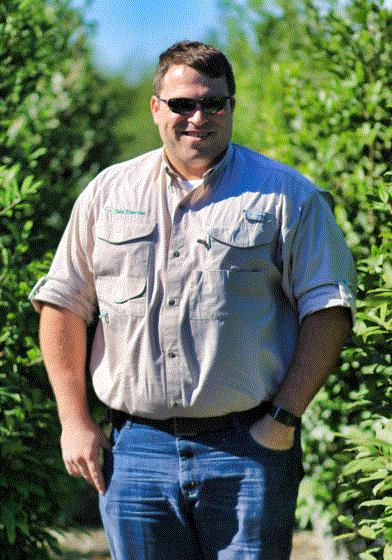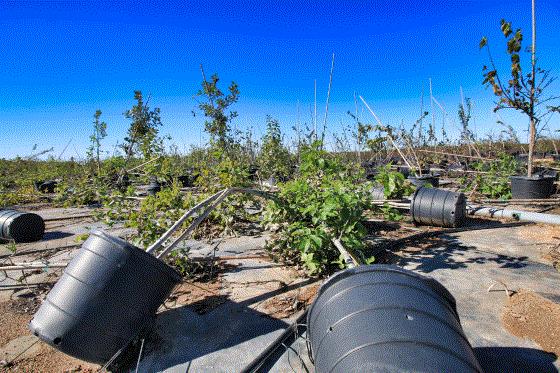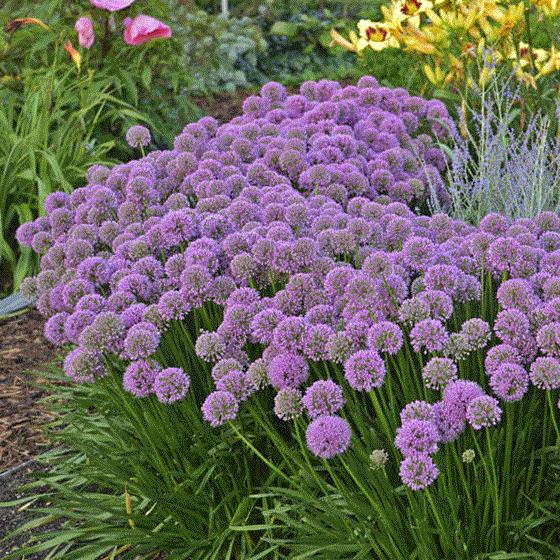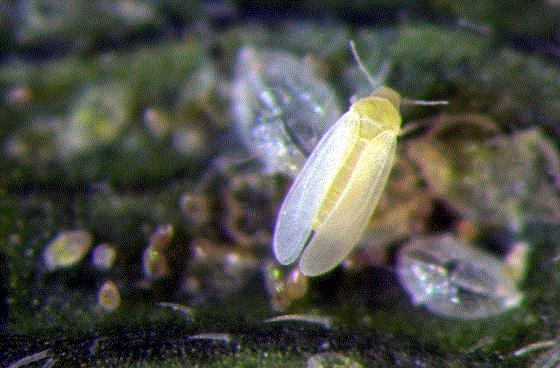Tree Town USA weathered TWO hurricanes
Last week, I was in Glen Flora, Texas, about an hour southwest of Houston, to meet Jonathan Saperstein, the 30-year-old owner and CEO of Tree Town USA, which bills itself as “America’s largest wholesale grower of trees and palms.” With three locations in Texas, four in Florida and a new (just acquired in September) West Coast division with nine locations in California (Village Nurseries), I think they can rightly claim that title.

You’ll read about Jonathan’s business philosophies in the December “Fast Company” issue of GrowerTalks (as I call our business issue, since we model it after that publication), but one thing I thought I’d mention now was the recent trial by fire … actually by wind and rain … that Tree Town USA faced.
Normally, having locations in different regions helps protects you from disaster. In this case, they were in the path of two: The Glen Flora farm was flooded and wind-damaged by Hurricane Harvey on August 26; 15 days later, their Homestead and Palm Beach County nurseries were struck by Hurricane Irma. I joked with Jonathan that all they needed was an earthquake in California. He smiled and reminded me about the recent fires there … thankfully, none were close to their facilities.
“We got hit pretty good during that time,” Jonathan said in a gross understatement of the two hurricanes, “yet at the same time it’s how the team came together, following our disaster preparedness plans – providing everything from additional standby generators to food and water for our employees … during those couple of weeks, we served 5,000 meals to our employees.”

In Glen Flora (above), where they also endured a couple of tornadoes during the hurricane, they lost some of their greenhouses, had severe flooding and a lot of mangled and broken trees. And hundreds of thousands of trees and shrubs that were blown over and sat in water for several days.
In Florida, their Homestead location lost all of its shadecloth, “but we’re growing primarily tropical palm trees, so the vast majority of inventory down there is okay without shade.” In Palm Beach County, which is field-grown material, they had a lot of flooding and some blown-over material that had to be staked back upright. They also lost some greenhouses and shadehouses.
But says Jonathan, “If it wasn’t for some of the flooding [in Glen Flora], our biggest loss due to the storm would have been the shutting down of the facilities for that number of weeks. I mean, you look at the month of September: for three of the weeks, we had at least one facility not operating. And for one of the weeks, we were only shipping out of our East Texas farm.
“And while this was all happening, we were about to close on the California acquisition,” he added. “It was a busy, busy month.”
Um, you could say that. Oh, as we closed that topic, Jonathan mentioned that the Bunnell, Florida, location was hit by Hurricane Matthew last year. And Glen Flora was hit by a tropical storm the year before that. Six facilities, four named weather events, two years.
If Tree Town USA doesn’t have a good disaster recovery plan by now, they never will!

Want a canna beer?
Some of you get a bit squirmy when I mention cannabis and some of you are blasé about the whole topic. Regardless, the topic is becoming more and more mainstream every week.
For example, how many of you enjoy Corona beer? I do. Well, Corona’s U.S. distributor, Constellation Brands, is investing almost $200 million in a 10% share of a Canadian cannabis grower, Canopy Growth Corp., with the idea of developing cannabis-based beverages. HERE IS THE STORY, as reported on the 420 Intel website.
Canada is expected to legalize recreational use of cannabis (excluding edibles) by July 2018, with edibles and drinkable product legalization coming in 2019. The U.S. is much farther behind Canada, but Constellation’s CEO says, “We’re obviously trying to get first-mover advantage.”
What I wonder is, what do you squeeze into the top of a cannabis beverage?
In memoriam: John “Jack” Brohl
Jack Brohl, founder with his wife, Marie, of Brohl’s Greenhouses in Macomb, Michigan, passed away October 24. He was 81. His daughter-in-law, Karen Brohl, sent me the news, saying she wanted to be sure his many industry friends heard the sad news.

Jack and Marie started their business in 1965, and today, all three sons work in the family grower/retail business, which is spread across 42 greenhouses. Brohl’s grows a wide range of crops, from spring through fall and poinsettias.
Karen says of her late father-in-law, “Jack will be missed by his family, of course, but there will be tears from the many fiercely loyal customers that he treated like royalty. His favorite thing was hauling customers around on his Gator, helping them pick out their plants. I have witnessed customers ask if we had a pop machine (which we did not yet have) and watch him go to the pole barn, pour them a glass of pop, then track them down to give it to them. That is the epitome of who he was.”

Allium Millenium is PPA Perennial Plant of the Year for 2018
I just gave away the entire story in the headline: The Perennial Plant Association has selected Allium Millenium as its 2018 Perennial Plant of the Year. I call that a great choice, as I’ve found allium to be a long-lasting, bulletproof perennial in my own garden. And it pairs well with other perennials. (We like it with white catmint, Calamintha nepeta.)
 Photo: Walters Gardens
Photo: Walters Gardens
PPA offered a couple of interesting factoids about the plant:
- Bred by Mark McDonough, horticulture researcher from Massachusetts
- Introduced through Plant Delights Nursery in 2000
- The result of a multigenerational breeding program involving Allium nutans and A. lusitanicum (formerly Allium senescens ssp montanum)
Now, before you holler at me for misspelling the cultivar name, note that this plant was registered as spelled that way. So it’s correct, even if it’s wrong, if you know what I mean. If Mark or somebody would like to explain the story behind the spelling, I’d love to know!
The announcement is fresh, so there are no allium resources yet available at PPA’s website (www.perennialplant.org), as they’re still promoting the 2017 Perennial Plant of the Year (asclepias). But call (614) 771-8431 and they’ll hook you up early.

Dümmen Orange produced flower arranging video series
I’m not sure how many of my readers deal in fresh cut flowers, but even if you don’t, you’ll enjoy this VIDEO from Dümmen Orange. It features Cleveland, Ohio-based florist Scott Robertson, co-owner and creative director of Stems Fleur, making a fall-themed flower arrangement using a pumpkin as a vase. I like that they filmed it in time-lapse, so you can see how it’s done in less than two minutes. Even if you don’t do cuts, you’ll find holiday inspiration. For instance, why not use similar annual flowers and plant them in a pumpkin?

Dümmen Orange plans on releasing four more holiday-themed videos, including winter holiday, Valentine’s Day, spring and summer.
Putting a positive spin on minimum wage hikes
Ellen Wells found an interesting news item from Canada’s Globe and Mail newspaper that presents Ontario’s pending minimum wage increase ($14 an hour starting in January) with a positive spin.
The paper interviewed South Seattle, Washington, small business advisor Steve Burke on the topic. Seattle and surrounding areas have been dealing with wage hikes for several years.
Steve’s advice? “Rethinking the type of employees they hire, the human resource management systems they employ, they can get greater productivity and efficiency in their business.”
Examples in the article of what some business owners have done in the face of minimum wage increases include:
- Creating an employee handbook that formalizes job descriptions and tasks, and outlines how long specific tasks should take
- Using an electronic key-card timekeeping system to track employee hours
- Rethinking the employee schedule, shifts and hours of operation
- Prioritizing the sales of higher-ticket items
- Reorganizing the retail environment to prominently display higher-margin items
- Encouraging sales staff to modify sales pitches
- Creating an online store
- Raising prices
Said the CEO of a Canadian small-biz finance organization, “[Minimum wage increase] kind of forced people to make some just generally good business decisions.”

Whitefly: The Importance of Biotype
AmericanHort’s research arm, Horticulture Research Institute (HRI), recently released some information that could help you figure out how to better combat whiteflies on your poinsettias (and plenty of other crops).
The document, called “Whitefly: What’s Your (Bio) Type?” references poinsettias, but it’s helpful information for leafy green, herb and veggie growers, as well. It homes in on one particular whitefly: Sweet Potato whitefly, or Bemisia tabaci, and the two types that growers are seeing, B and Q.

“Biotype B can be controlled using regular methods and even some biologicals. Fortunately, B is the most common biotype in the U.S. Biotype Q, on the other hand, is resistant to many classes of insecticides, such as some insect growth regulators, pyrethroids and some neonicotinoids,” the document states.
That’s why it’s important to know your type because some combinations of insecticides encourage a shift from a mix of B and Q to only Q, which is harder to eradicate, says Dr. Lance Osborne, a researcher from the University of Florida who studied the efficacy of insecticide rotations along with Dr. Cindy McKenzie of USDA-ARS. “That being said, the populations are still manageable with the tools we have,” he adds.
Click HERE to read the full document, which includes new pesticides to help combat Biotype Q. And find out more information about Lance’s and Cindy’s studies here: http://mrec.ifas.ufl.edu/lso/bemisia/bemisia.htm.

Meet Chili, the insect-sniffing dog
 Photo: Melissa Nakhavoly/CBC
Photo: Melissa Nakhavoly/CBC
You expect your IPM scouts to be dogged in their duties. Well, at NatureFresh Farms in Leamington, Ontario, their scout is as dogged as they come. She’s Chili, a two-year-old Belgian shepherd that's been trained to sniff out pepper weevils. Her nose is sensitive enough to find a single adult weevil even inside a pepper. That helps NatureFresh focus pest management strategies on very specific areas of the greenhouse.
Editor Jen Polanz reports that, while Chili may be the first dog to work in greenhouse pest management, she’s not the first dog used for pest detection.
“Here in Montana, Working Dogs for Conservation has been training dogs for habitat and wildlife conservation efforts for years and their work now takes them all over the world. They’ve trained dogs to detect pests and invasive species, including the emerald ash borer, rosy wolf snail, yellow star thistle and Chinese bush clover. They also do work in Africa detecting poached ivory and rhino tusks, as well as aquatic invasive species work. And they’re currently working on a project using dogs to detect disease in wildlife. What’s even better is that they use rescue dogs. For the dogs, it’s just a game. A great game.”
Read the full story and watch a short video of Chili in action HERE.

Finally ...
Where’s Chris this time? Off to Orlando for the Redux of FNGLA's The Landscape Show. Not sure if I’ll get into any greenhouses or not (if you’re in the Orlando area and don’t mind me dropping by to see what you’ve got going on, drop me a line at beytes@growertalks.com), but I'll cover the show and talk to growers about life post-Irma. And I’ll be helping put the finishing touches on the 2018 Tropical Plant International Exhibition, slated for January 17-19 in Ft. Lauderdale.
Which I guarantee will NOT be postponed due to hurricane.
See you next time,

Chris Beytes
Editor
GrowerTalks and Green Profit
This e-mail received by 22,206 loyal readers!
Thanks to my loyal sponsors, who help me reach the 22,206 readers of Acres Online in 66 countries! Want to be one (a sponsor, that is)? Give Paul Black a shout and he'll hook you up.